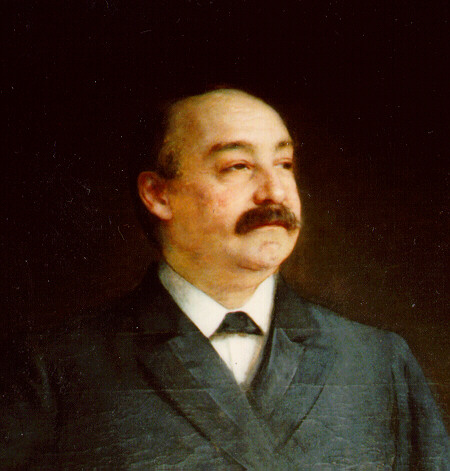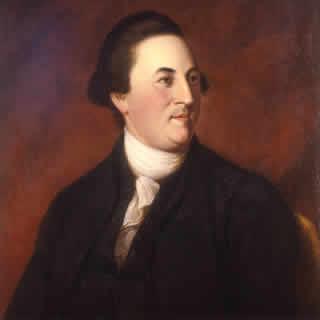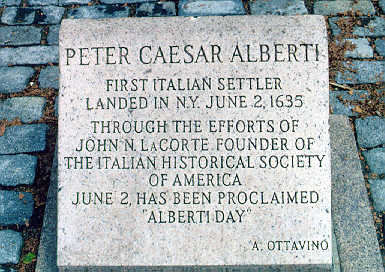For the last 40 years, the Italian Historical Society of America has held an annual ceremony at the Department of Justice commemorating the accomplishments of Charles Bonaparte. Below are the comments of Arthur Gajarsa, Judge, United States Court of Appeals of the Federal Circuit.
Remarks of Arthur Gajarsa Judge, United States Court of Appeals of the Federal Circuit
Delivered at the Grand Hall of the Department of Justice June 26, 1998 - Washington, D.C. on the occasion of the annual commemoration of the Italian Historical Society of America of Charles J. Bonaparte Founder of the Federal Bureau of Investigation
Bonaparte the Reformer
It is my pleasure to be with you today. It is truly an honor to provide remarks at this ceremony which has graced so many individuals over the years, including Attorney General Robert Kennedy and our own Judge Re. I want to thank Associate Attorney General Raymond Fisher, my good friend, for taking time out of his busy schedule to greet you.
Much can be said about the accomplishments of Charles Joseph Bonaparte. He was a member of the Indian tribal commission, the secretary of the Navy, and the 46th Attorney General of the United States. He also argued over 50 Supreme Court cases and led the Department of Justice in pursuing landmark antitrust investigations involving the Standard Oil Company, the American Tobacco Company and the Union Pacific Railroad, and, perhaps most prominently, 90 years ago, he founded a small unit of Justice Department investigators that, over the years, has become the preeminent criminal investigative agency in all the world - The Federal Bureau of Investigation.
As one who immigrated to this country from Italy, I find it truly remarkable that Bonaparte accomplished all these things during a darker time in our nation's history, when there were decided and overwhelming prejudices - particularly in the power structures of the Nation - against persons with olive-colored complexions and names ending with a vowel. Do not think that I am overstating, remember that in 1906, the same year Bonaparte was appointed Attorney General by President Teddy Roosevelt, the United States paid indemnity to Italy because of the failure of New Orleans officials to prevent the mass lynching of Italian citizens.
But, perhaps even more remarkable is the fact that Bonaparte obtained his many appointments neither by culling favors, nor by hanging onto the coattails of some political impresario. Rather, he was an honest-to-goodness, dyed-in-the-wool, brash reformer -- one who sought to shake the very foundations of the political structures and government of his time. Susan B. Anthony, obviously a major reformer in those times. She once wrote that "[C]autious, careful people, always casting about to preserve their reputation and social standing, never can bring about reform. Those who are really in earnest must be willing to be anything or nothing in the world's estimation." In other words you must be willing to give it all you have to make a difference.
I believe that Attorney General Bonaparte certainly had those qualities required to make a difference. In fact, without diminishing all of his many accomplishments, I believe that it is as a political reformer that Bonaparte most distinguished himself.
In 1874, when Bonaparte began practicing law, public corruption in Maryland was said to be the worst in the country. In an article in Forum magazine, Bonaparte described this sad state of affairs, noting that the politicians of his era "[w]heter technically criminals or not, . . . are the allies and patrons of habitual lawbreakers."
Seeking to change this, in 1881, Bonaparte assisted in founding the Civil Service Reform League. As head of those organizations, Bonaparte concentrated not only on cleaning up his native Baltimore, but also on reforming the political stage of the country at large. Notably, he focused his reform efforts not just on the institutions and process of government, but also on raising the responsibility and consciousness of the citizenry and the electorate.
Bonaparte firmly believed that a nation of free citizens elects the kind of government it deserves. In 1897, he gave a speech on this subject in which he said:
To have a popular government we must, first of all, and before all else, have good citizens.... When we find any self-governing community afflicted with misgovernment, we can safely and fairly believe that it does not deserve a better fate. It may indeed wish to be governed, just as many a drunkard, in his seasons of repentance and headaches, wishes he were temperate.... But, as such, men do not wish hard enough to keep away . . . from the bar . . . so such a nation, state or city does not wish hard enough for good government to make bad government impossible.
Now Bonaparte certainly did not ignore the need for good government institutions. To the contrary. But, here again, he focused not on inanimate processes or functions, but rather on the quality and character of the individuals that made up the government.
Speaking as the president of the National Municipal League in Montreal in April, 1910, he said "[I]nstitutions are in politics what fortifications are in war; each, if well planned, may aid good and brave men to do their duty; neither can take the place of such men; . . . and in government, no less than warfare, it is, after all, the human element that counts."
Those who have spoken at this ceremony in past years have eloquently linked Bonaparte's philosophy to current events, demonstrating his relevance to modern times, particularly in the area of government reform. Certainly, government reformists today would do well to be guided by Bonaparte's views regarding the functions of Government Institutions and the responsibilities of the citizenry.
Bonaparte subscribed neither to the politics of fear, where monstrous dangers immobilize the citizenry, nor to the politics of blind faith, where citizens are expected to abdicate entirely their fate to those in power. Rather, he subscribed to the politics of individual responsibility, in which each citizen takes an active role in the affairs of government. Bonaparte believed that the important decisions of the day can still, and ultimately must be, shaped to the will of a well-informed and politically active public. As president Dwight Eisenhower once said: "Politics ought to be the part-time profession of every citizen."
Skeptics would say that society has changed dramatically since Bonaparte walked the streets of this city. They would argue that it is hard enough getting individuals excited enough to bother voting, let alone persuade them to pursue important issues of our time with the passion and fervor that marked Bonaparte's career. These skeptics would say that today politics has either been so trivialized as to make the ideas of an active citizenry needless, or so polarized as to make those ideas irrelevant.
This cynicism of today, however, is not unlike the cynicism that I am sure Bonaparte faced each day - - After all, Bonaparte lived during the worst days of Tammany rule in New York City and Mayor Curley in Boston. And certainly just like today, Bonaparte faced political and societal debates that boiled down to a competition between the special interests and the individual citizens. But yet, Bonaparte refused to be numbed into indifference by the cynicism of his time, the constant harangue of naysayers and the seemingly insurmountable problems that plagued the political systems in which he thrived and conquered. Indeed, I suspect when confronted by the naysayers of his time, Bonaparte reminded them of what another Italian, Dante, had said a few centuries earlier, namely, that the hottest places in hell were reserved for those in time of moral crisis preserve their neutrality.
So, today, let Bonaparte inspire you to hold and passionately pursue your views of the issues of our times. It is necessary that ordinary citizens raise their voices to participate actively in our government. It is our duty as good citizens not to remain silent. If we each can do this then, I believe, we will truly be living not in the shadow, but in the brightness of the tradition of greatness of one Charles Joseph Bonaparte.
Thank you for coming today.
Additional Readings:
From the Congressional Record of 1961 of the House of Representatives Commemorating Charles J Bonaparte



